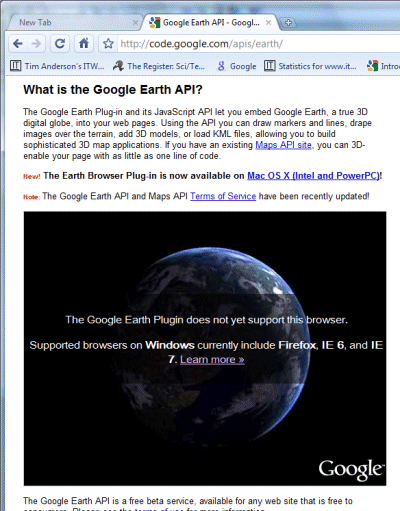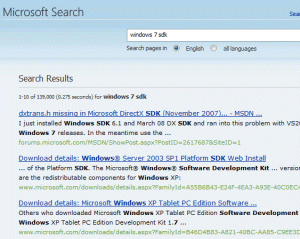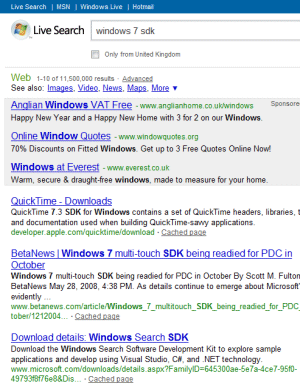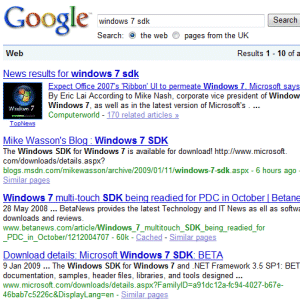So Bing (Bing Is Not Google?) is Microsoft’s new search brand. A few good things about it:
1. Short memorable name, short memorable url
2. Judging by the official video at http://www.decisionengine.com/ Microsoft realises that it has to do something different than Google; doing the same thing almost as well or even just a little better is not enough.
3. Some of the ideas are interesting – morphing the results and the way they are displayed according to the type of search, for example. In the video we see a search for a digital camera that aggregates user reviews from all over the Internet (supposedly); whereas searching for a flight gets you a list of flight offers with fares highlighted.
This kind of thing should work well with microformats, about which Google and Yahoo have also been talking – see my recent post here. But does Bing use them? That’s unknown at the moment, because the Bing Reviewer’s Guide says little about how Bing derives its results. I don’t expect Microsoft to give away its commercial secrets, but it does have a responsibility to explain how web authors can optimise their sites for Bing – presuming that it has sufficient success to be interesting. Where is the webmaster’s guide?
Some things are troubling. The Bing press material I’ve seen so far is relentlessly commercial, tending to treat users as fodder for ecommerce. While I am sure this is how many businesses perceive them – why else do you want users to come to your site? – it is not a user-centric view. Most searches do not result in a purchase.
There’s a snippet in the reviewer’s guide about why Bing will deliver trustworthy results for medical searches:
Bing Health provides you with access to medical information from nine trusted medical resources, including the Mayo Clinic, the American Cancer Society and MedlinePlus.
No doubt these are trusted names in the USA. Still, reliance on a few trusted brands, while it is good for safety in a sensitive area such as health, is also a route to a dull and sanitized version of the Internet. I am sure there are far more than nine reliable sources of medical information on the Web; and if Bing takes off those others will want to know why they have been excluded.
Back to the introduction in the Reviewer’s Guide:
In a world of excessive choice and too much information, it’s often difficult to make the right decision. What you need is more than just a search engine; you need a decision engine that provides useful tools to help you get what you want fast, rather than simply presenting a list of Web links. Bing is such a decision engine. It provides an easy way to make more informed choices. It organizes popular results by category to help you get the answers you’re looking for without having to guess at the right way to formulate your query. And built right into Bing is a set of intelligent tools to help you accomplish important tasks such as buying a product, planning a trip or finding a local business.
Like many of us, I’ve been searching the web since its earliest days. I found portals and indexes like early Yahoo and dmoz unhelpful: always out of date, never sufficiently thorough. I used DEC’s AltaVista instead, because it seemed to search everywhere. Google came along and did the same thing, but better. Too much categorization and supposed intelligence can work against you, if it hides the result that you really want to see.
Live Search, I’ve come to realise (or theorise), frequently delivers terrible results for me because of faulty localization. It detects that I am in the UK and prioritises what it things are UK results, even though for most of my searches I only care about the quality of the information, not where the web sites are located. It’s another example of the search engine trying to be smart, and ending up with worse results than if it had not bothered.
Still, I’ll undoubtedly try Bing extensively as soon as I can; I do like some of its ideas and will judge it with an open mind.



